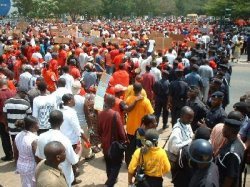- Home - News
- TWI News | TV
- Polls
- Year In Review
- News Archive
- Crime & Punishment
- Politics
- Regional
- Editorial
- Health
- Ghanaians Abroad
- Tabloid
- Africa
- Religion
- Election 2020
- Coronavirus
- News Videos | TV
- Photo Archives
- News Headlines
- Press Release
General News of Monday, 19 September 2011
Source: GNA
Agogo farmers petition government on activities of Fulani herdsmen

Farmers at Agogo in the Asante Akim-North Municipality have renewed their appeal to government to act decisively to end the lawlessness and criminal activities of Fulani herdsmen in the area.
They said the alien herdsmen and their animals had become a major threat to the peace and security of the people in the area.
The farmers accused the Fulani herdsmen of killings, maiming, destruction of farms and crops as well as pollution of streams and other water bodies.
Mr Seth K. Amoah, Secretary of the Agogo Concerned Citizens Association, expressed these concerns at a forum jointly organized by the Ghana Journalists Association, KAB Governance Consult and the BUSAC Fund, to enable the farmers to articulate their concerns.
It comes amidst growing anger and tension in the area between the local people and the herdsmen.
There have been deadly intermittent clashes between the people and the herdsmen since 1997.
Mr Amoah alleged that more than 20 farmers had been killed by the herdsmen over the past 14 years and that “These Fulani herdsmen continue to threaten us with dangerous weapons - guns and cutlasses.”
He said the reign of terror that the herdsmen had virtually imposed on the people in the area was affecting food production.
Mr Amoah said all attempts to get the Agogo Traditional Council to evict the Fulani herdsmen from the vast lands it had released to them had so far proved unsuccessful.
He said the people have been pushed too much against the wall and they could be forced to fight back.
Madam Akua Baah, a 60-year-old farmer, alleged that about three weeks ago, when she and the husband, Kwame Awuah, were returning from the farm, some unidentified Fulani herdsmen attacked them and shot the husband dead.
Mr Bright Blewu, General Secretary of the GJA, advised the people to use the appropriate channels in solving their problems.
He appealed to the Agogo Traditional Council and the Municipal Assembly to come together and find lasting solution to the crisis.










